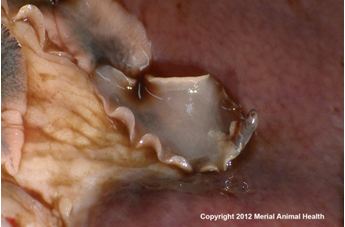



Potential For Dire Liver Fluke After Mild Wet Winter
UK - Farmers should stay vigilant against liver fluke following an exceptionally mild and wet winter, warn Merial Animal Health experts.This is the message of Mrs Lynda Maris, Brand Manager with Merial Animal Health who urges stockmen to continue fluke treatment after turnout.
“While most farmers are aware that fluke can affect cattle during the winter months, and focus on giving a housing dose, many are unaware of the increasing importance of controlling fluke infections during the spring and summer months and the benefits of giving a fluke treatment as part of their grazing treatment programmes.”

And Mrs Maris emphasised the benefits of prompt treatment. Even at low levels live weight gain can falter by 1.2 kilograms per week.
Infection can cost £87 per beef animal infected while no obvious clinical signs are displayed, English Beef and Lamb Executive research shows.
"On this basis it is extremely cost effective to treat against the parasite,” said Mrs Maris. “Such a reduction in live weight gain increases the time to finishing and obviously every additional day that an animal is kept on farm costs the farmer money."
Merial therefore advises that a fluke treatment post-turnout can break the fluke's life cycle.
This reduces infection risk later in the season and allows cattle to get more from a farmer's cheapest feed source - grass.
Animal treated for fluke and worms can yield 31 per cent greater weight gains over untreated cattle and a 8 per cent increase over cattle just treated for roundworms, a study in Veterinary Parasitology has shown.
Merial's advice is that there is usually an eight to 12 week delay between cattle being fluke infected at pasture and the point where the egg laying adults are in the liver.
This means treatment should be given eight to 10 weeks after turnout, often coinciding with worming treatments on many farms.
TheCattleSite News Desk

.JPG)

